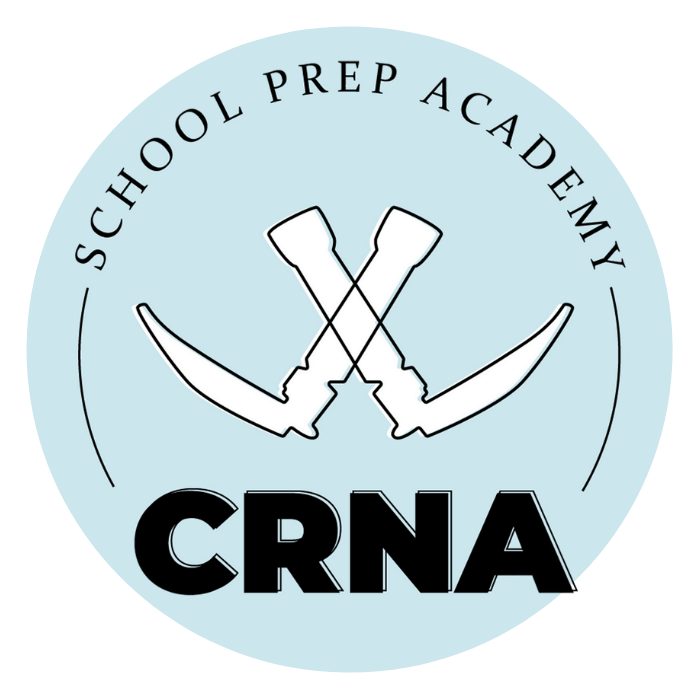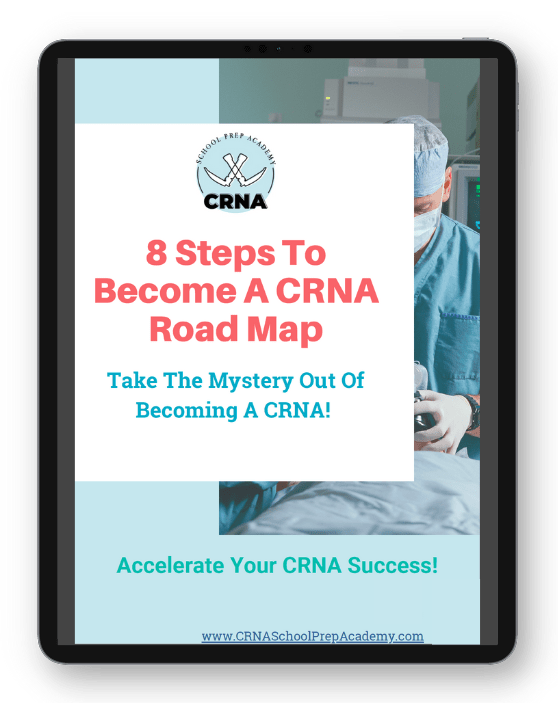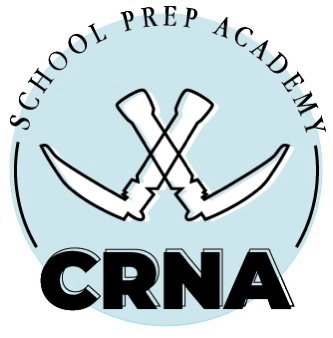
Am I too OLD to go back for CRNA? It’s a very common question asked inside our communities, and the decision can feel really overwhelming. The good news is, whether you’re looking at a career change, or just getting a later start, CRNA is a total possibility for you!
In today’s episode, we’re busting through the most common fears in regard to age when applying to school, including:
A realistic look at your financial situation (and how much CRNAs can potentially earn)
How to navigate retaking courses if you’ve been out of the academic game for a while
How to make your extensive ICU experience work FOR you as you become an SRNA
The role that your mindset plays in your success and overcoming your unique challenges as you pursue CRNA
How going back to school later can actually be highly beneficial
If CRNA is your dream, then it’s time to follow your heart! It’s never too late to make a step toward a career that you love. We’ve got your back, future CRNA!
Get access to planning tools, valuable CRNA Faculty guidance & mapped out courses that have been proven to accelerate your CRNA success! Become a member of CRNA School Prep Academy here:
https://www.crnaschoolprepacademy.com/join
Book a mock interview, resume edit or personal statement critique:
Join the CSPA email list: https://www.cspaedu.com/podcast-email
Send Jenny an email or make a podcast request!
Hello@CRNASchoolPrepAcademy.com
—
Watch the episode here
Listen to the podcast here
Am I Too Old To Pursue CRNA?
I wanted to come here to thank you guys for being loyal readers. I appreciate you joining me here. It means a lot to me, and I enjoy so much helping you along your CRNA journey. I wanted to remind you if you have not checked out CRNASchoolPrepAcademy.com, go ahead and see what that’s all about. We would love to mentor you inside the academy, for our students, high-five, big shout out to you. We appreciate you. We love all of you guys. It’s so exciting to see you grow along this journey. If you’re looking for more personalized guidance along your CRNA journey, it doesn’t matter where you are- we have people who are still in nursing school.
I will say about the nursing school, though. The ideal time to join a nursing school is probably towards the end of it, the senior nursing school, and from there on, but you can be an ICU nurse for six years. You could have started your ICU journey. CRNA School Prep Academy will give you that one-on-one mentoring and guidance you need to tackle your goals without hitting any roadblocks. The sooner you start investigating this career path and taking it on and jumping all in, the better you’re going to be and the more prepared you’re going to be.
We do educational workshops and live Q&A sessions every single month. Those are things that are going to help propel you towards your goal and allow you to miss the barriers and obstacles that may stand in your way and get the guidance you’re seeking. Check out CRNASchoolPrepAcademy.com for more information. We hope to see you there. Let’s get into the show.
—
We are going to talk about a big question that I get from a lot of people, which is, “Am I too old to go back for CRNA?” I want to start this episode off by saying, first of all, no, because you’re never too old to do something you want to do ever. Maybe if you’re 85, that’s probably too old. In all seriousness, where we need to start with this question is to be realistic with yourself and run the numbers.
What I mean by that is how much debt would you have to take on to go back to CRNA school? How many working years would you have left after graduating from CRNA school? Ask yourself how badly you want this. Is this a game breaker for you? Are you so miserable doing what you’re doing that you either go back for CRNA, or you find a completely different career path where you’re at your breaking point and you need something different, or you can’t continue on? That would play into it too.
There are plenty of second-career CRNAs out there. I’ve worked with plenty of them. You don’t even have to be old to be a second-career CRNA. I’ve met plenty of students too who go back. I worked with a CRNA not that long ago who was an accountant, a dental hygienist, and a vet tech. I know a veterinary school is crazy-expensive. That would be crazy to go back after veterinary school. Plus, it takes a long time. There’s someone I know who was an IT specialist who spent almost twenty years of his career doing IT.
You're never too old to do something you want to do, ever. Click To TweetThen he became a CRNA. He’s close to 50. It doesn’t matter where you are in your career. You have to make sure this is what you want. Know your numbers, be realistic with yourself, know what you can afford and what your retirement situation is like. The last thing you want to do is, if CRNA school is going to be a big financial burden on you, you don’t want to take on $200,000 of student loan debt when you only have eight working years left. Be realistic with yourself, run the numbers, and know what you can afford. If you can afford to pay for CRNA school in cash, more power to you. You can get out and work the last ten years and save up.
If you’re thinking about numbers, CRNAs, on average, make about $100,000 more a year than an RN. That’s pre-COVID pay. I know some of what they’re paying these nurses to do COVID assignments, is insane. That’s not going to be around for much longer. I also know traveling has always historically been a good pay rate for nurses. However, do you want to spend your entire life traveling around? Maybe you do.
Like me, I probably could have done travel nursing for a period of time, but if I ever wanted to settle down and have a family…I can’t have a kid and travel around unless I want to leave my kid home with my significant other while I work and miss out on important parts of their life. You have a school system. You can’t move around every three months. Based on your lifestyle, where you’re at in life, and what you want in life determines whether you can even do travel nursing.

Historically, CRNAs, on average, make anywhere from $100,000 to even $150,000 more per year than an actual RN salary. Do you want to know how much I made as a nurse? You’re going to probably be like, “What?” This was not that long ago. I graduated in 2009 with my BSN, $24 an hour. That’s after my CCRN. I had a boost when I got my CCRN. I remember being upset. My dad’s a truck driver. I love my dad. He’s awesome. I remember he was complaining because they gave him a pay cut.
He was making $28 an hour as a truck driver. I remember being like, “Dad, I have $90,000 of student loan debt. I work in an ICU and do some gross things, and you make more than me. What is this? It’s not fair.” There’s a wide range of what nurses can make. 2009 is not that long ago. I don’t think I’m that old yet, but I know averages here. Run the numbers, know what you can afford to spend for school, and know how much it’s going to boost your bottom line. How much is it going to raise your total income? You also want to take taxes into consideration.
CRNAs make more, but you also pay more in taxes. Is it going to bump up to the next tax bracket based on you, your spouse, or whoever? Know your financial situation. That’s key to deciding whether CRNA is right for you later in life. My classmate was 52 when she graduated. She’s still a CRNA. She loves it. I’ve never had anyone say they regret it, but you have to be smart about it. As far as handling CRNA school from an academic standpoint, maybe it’s not even financial. Maybe the finances are not even a thing.
Know your financial situation. That’s key to deciding whether CRNA is right for you later on in life. Click To TweetYou’re like, “I know I can afford it, and it will be beneficial for me to spend the last ten working years as a CRNA financially, but what if I can’t cut it academically?” That’s what you’re more nervous about if that’s you. I can assure you that you can. While I’ve had students who are older tell me they feel like they are the difference between them and their younger counterparts or whatever, it’s no different as in you can’t do it, but it’s probably different in how much effort it’s going to take you to do the same thing.
Someone who freshly graduated from their BSN, worked two years in ICU while taking graduate-level courses, and went right into CRNA school is still very academically fresh. It hasn’t been several years since they took a Microbiology and Stats course. That’s their advantage. They don’t need to refresh on as much stuff as you will being out of school for 10, 15, or 20 years. That’s the advantage they have, but it doesn’t mean you’re not capable. You may require more studying, probably, if it’s been that long.
A lot of these programs will require you to have your certain sciences within anywhere from 5 to 10 years. I say 5 to 10 years because all schools are a little different. The vast majority will say ten years, but there are a few schools that want your sciences within five years. You have to research your school early on because if you happen to want to apply to the school that requires it within 5 or 10 years, you need to know early on, so you have time to do those courses. Don’t go sign up for random courses. Make sure you know which courses they want you to retake.

It’s probably not going to be everything. It might be Chemistry, Biology, and maybe Anatomy or Pathophysiology. That might be it. You want to make sure you know, and maybe even a grad stats course of some kind, but you have to look into your school first because some may prefer Physics. You have to research your school and know what they want to have of you. If you’re barely hitting that deadline, maybe it’s caught up on nine years.
By the time you apply for an interview, you’re going to be hitting that ten-year mark. Ask them if that’s okay. Say, “I’m going to be hitting that cut off here soon. Should I go ahead and retake a few courses?” It’s never bad to retake some courses, not even retake, but take courses, in general, like a graduate-level course. Being out of school for so long but having a fresh Pathophysiology graduate-level course and you get an A proves to them that even though you’ve been out of school for fifteen years, you can still get an A in a very hard graduate-level Science course.
It reassures them that you’re ready to be a learner again. You’re willing and able to jump back in academically. It’s never a bad idea to at least have a fresh course of some kind under your belt when you apply to CRNA school if you’ve been out of school for 15 or 8 or 9 years. It proves to them that you’re willing and able to be a learner again. That’s the other point I want to make. If it’s not finances or academics, sometimes it gets to be, “I’ve been an ICU nurse for fifteen years. Is that going to hurt me?” The answer to this is gray because it’s a yes and no answer. Not that the experience is not amazing. That is an amazing experience. The question is, what goes into that experience?
When you're in your interview, make sure you make it known that you are willing to be a student again. Click To TweetAre you set in your ways? Are you going to be able to be an SRNA, Student Registered Nurse Anesthetist, in clinical after you have fifteen years of being the top dog? You’re the head honcho, the top ICU nurse, the head of your game. Now you’re here again. How are you going to handle that? Having a preceptor who’s probably younger than you giving you a direction, they’re going to be judging this in your interview. They’re going to be trying to gauge your personality. They’re going to try to say, “Do they get defensive? Are they quick to react and get defensive about something they’re wrong about?” It’s addressing the elephant in the room.
It’s like I tell students if they have a lower GPA or anything like that on their resume. They’re nervous or scared as they think it could be a red flag. Address it, bring it up in a way that’s casual. I know I’ve been out of school for a while. I’ve been an ICU nurse for fifteen years, but I precept students a lot as an ICU nurse. I’m into mentoring. I know what it’s like to be a student. I can relate to them. I’m ready and able to be a student again myself. I don’t know what you want to say, but you’d have to try to sell it as you’re willing and able to be a novice again, essentially, someone who’s not going to know it all and have to ask for guidance and support.
Taking a graduate-level course is one piece of the puzzle. You want to prove to them that in clinical, you’re going to be okay as well. Academics is one thing, but if you can’t clinically be essentially a student again, they may worry about that as well. Plenty of successful SRNAs are older when they start their journey. It doesn’t mean they’re any better or worse off clinically. It depends on the personality. Before I left one of my last positions, people would ask me, “Does more ICU experience make you better in clinical? How does that shake out?”

Some people who barely have experience worry about not being good enough in clinical, and someone who has too much experience worries about not being good in clinical. I’ve seen both ends of the spectrum where I’ve seen an ICU nurse with barely any ICU experience come in and rock it. I’ve also seen that same situation come in, and they struggle a little bit more from the beginning. You’ll probably more likely to struggle than rock it, to be quite honest with you, and not because they’re not going to rock it. They always do.
Initially, they may be a little fresh. Their skills aren’t there because they didn’t perfect them in the ICU. They’re starting a little greener, but they always pick up on it. They always improve versus someone coming with 10 or 15 years of ICU experience, which is probably good at things like IVs, maybe multitasking, and titrating drips. They tend to pick up on those things much quicker. Sometimes, they may have a hard time handling criticism or direction, but at the same time, I haven’t ever experienced that to the point where it’s ever been hindersome in their development and progress.
I’ve also seen these nurses come in with 10 or 15 years, and it’s awesome because they’re like rock stars. They have all this experience titrating, drips, multitasking, managing these critical patients, and doing all those different things at once. Essentially in anesthesia, that’s what you do. You multitask, and at the same time, you’re managing the ventilation, managing their blood pressure, their fluid, and their sedation. You’re doing all these things simultaneously, taking direct analysis from the surgeon, communicating with your attending, coming up with a plan, and planning for induction, maintenance, and emergence.
You’re doing all these things that your brain’s always going. Nurses with a lot of ICU experience pick up on that much easier and are quick to run with that. The only problem I could see someone with a lot of experience having is taking direction and not getting offended essentially if they’re not correct. Here’s the thing too, I have got to say this because I’m a preceptor…I remember being a student. There are a million ways to do anesthesia, but it’s more about being open to new ways. It’s not that your preceptor is always right or as better essentially. Be open to learning something new and different.
It’s more about being open to being adaptable and knowing that, “Let’s see your technique and your way.” Quietly on my own time, I’ll decide whether I like it or not, or I want to put it into my practice someday. One of the reasons why I love being with students as a CRNA is because those students pick up on other CRNAs techniques, and then I see them, and I’m like, “I like that.” It seems so simple, but it’s awesome using a 10-cc syringe, pulling the plunger all the way out, and using that 10-cc syringe to stop your suction from hissing at you. You put it underneath the pillow of the bed, so it’s right there and ready to go when you’re doing your induction.
That seems simple, but I saw a student do it one day, and I’m like, “I like that.” They probably saw CRNA do it, picked up on it, and used it. Being with students, I learn from my students’ different techniques that they learned from their CRNAs. Not everything your CRNA does is something you’re going to like but that doesn’t mean they’re wrong. It doesn’t mean you’re wrong, either, it’s just a different way. It’s more about embracing being uncomfortable, and doing something that you’re not used to as a student. Someone who’s been an ICU nurse for a long time may have a harder time doing that. Most of the time, it doesn’t prove to be true. It’s a possibility. I want to throw it out there.
When you’re in your interview, make sure you make it known that you are willing to be a student again. You’re excited. You’re ready to learn. You know you’re going to be a novice. You’re going to have to ask questions. You’re going to be taking advice from your preceptors who are younger than you, and you’re ready for that. It’s not going to be a problem at all. I hope this episode helps you or essentially reassures you that age is only a number. It’s where you’re at in your mind. Whether you do or don’t do CRNA, you still have working years left and want to be happy. Make that judgment call for yourself.
Know your numbers, be smart about it, but essentially follow your heart. If that’s what you’re destined for and want to do, don’t take no for an answer. Do what you want to do, whether that’s CRNA or something else. Even if it’s only 5 or 6 years, maybe it’s not CRNA, but maybe it’s something else. You want to make sure you’re listening to what you want to do because who wants to be miserable in their career? Nobody does. If in CRNA you’re going to be happy and thrive, by all means, high five, go for it.
One last thing, I’ve also heard from my students who are approaching the older side or maybe in their 40s or 50s, or whatever you want to consider as old, is age is just a number. School is hard for everyone, but let’s say their kids are grown and out of the house. They don’t have to juggle all the things that they were juggling when they were in their 30s and younger with kids because now their kids are adults. They don’t have to dress their kids or wipe butts. There are some benefits of waiting until you’re older to return to school. That’s one more positive. I hope you have a good day. We’ll see you next episode.
Important Links
Get access to planning tools, valuable CRNA Faculty guidance & mapped out courses that have been proven to accelerate your CRNA success! Become a member of CRNA School Prep Academy here:
https://www.crnaschoolprepacademy.com/join
Book a mock interview, resume edit or personal statement critique:
Join the CSPA email list: https://www.cspaedu.com/podcast-email
Send Jenny an email or make a podcast request!


